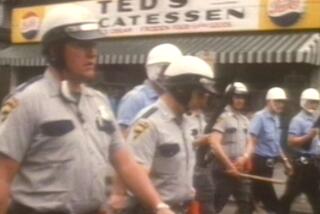In a Dirty Job, the Dirt Coats Everything : Police: We often let misconduct slide because we’re uncomfortable with the mission of protecting one segment of society from another.
- Share via
In Detroit, three police officers are being tried in the beating death of a black motorist as other police officers, it is said, stood by and watched. How will this case come out? Consider two recent, similar cases: A Miami police officer was acquitted in a retrial for the deaths of two black motorcyclists--even after he’d been convicted once. And in Los Angeles, what appeared to most Americans to be a simple case--the beating of Rodney King was on videotape--required two trials, the full investigative resources of the FBI and a team of federal prosecutors to obtain a partial conviction.
In fact, juries in civil and criminal cases have consistently refused to hold police officers accountable for alleged misconduct. In Los Angeles, juries have almost always vindicated officers charged with beatings or theft of evidence, no matter how strong the case against them.
Why are juries, and the American communities from which they are drawn, so willing to tolerate police misconduct, which they know to be wrong? The usual explanations, which focus on racism and related factors, contain some truth. But they do not account for the cases in which juries have failed to convict officers who brutalized white victims, as well as the cases in which non-white jurors have voted to exonerate such misconduct.
Another explanation holds that Americans are willing to forgive the police their indiscretions because the police stand as the final barrier between “civilization” and the “urban jungle.” Indeed, it is said that police must sometimes adopt the very techniques used by their adversaries in order to prevail. This explanation is also not totally satisfactory: Juries have exonerated officers who acted not to “protect society” but to enrich themselves at society’s expense--stealing evidence (usually cash) needed to prosecute criminals.
A deeper answer to this behavior lies in the responsiveness of the American imagination to idealistic principles. Thus, when the public understands a government policy to reflect this country’s loftiest ideals, the public enthusiastically supports that policy and expects that the means used to carry it out will accord with those ideals. For instance, Americans have high expectations of the presidency, and it was these expectations that ruined Richard Nixon.
When the government pursues a policy at odds with such ideals, the public may support that policy, but without expectation that its implementation will conform to those ideals.
Police efforts to protect “civilization” from the “underclass” have not evoked any sense of idealism in the American public. Indeed, those efforts undermine the beliefs of a society that views itself as classless, providing opportunity for all. Consequently, the public has judged police performance not by a standard of idealism, but by a standard of self-interest that tolerates police misconduct.
The peculiar logic behind such tolerance of official misconduct is best exemplified by public attitudes during the Vietnam War, most glaringly in response to the My Lai massacre. By the time of the massacre, America was no longer proud of its involvement in the war. The moral justification that Americans have always demanded when going to war had come to be seen as hollow, if not hypocritical.
Without a moral purpose, conduct by GIs that would never have been tolerated by the public in a “good” war was understood and excused as the inevitable result of a difficult war. It was said in defense of those who participated at My Lai: How could anyone avoid mental breakdown after continuous contact with a deadly enemy disguised as a friendly adult or a smiling child? The public’s willingness to accept this psychological explanation as a legitimate excuse for the massacre followed logically from the war’s lack of high moral purpose.
As during the Vietnam War, the public’s current grudging acceptance of a government policy--holding the “urban jungle” in check--has bred a tolerance of the misconduct that accompanies implementation of that policy. This role of urban police forces is plainly inconsistent with America’s best view of itself as a society that is unique in its striving to be egalitarian and democratic. That thousands of men and women are employed to protect one segment of society from another does not comport with this idealistic view. Until the public concludes that its collective interests are best advanced by police who truly “protect and serve” all segments of society, people will continue to hold police to the same low standard that inspires their urban mission.
More to Read
Sign up for Essential California
The most important California stories and recommendations in your inbox every morning.
You may occasionally receive promotional content from the Los Angeles Times.










